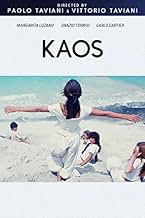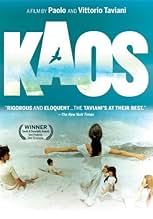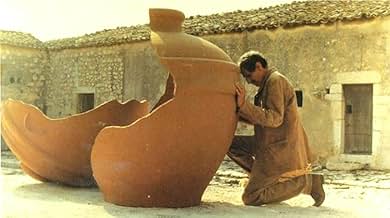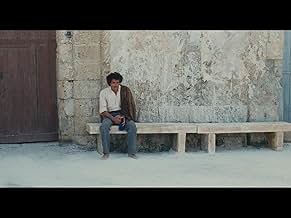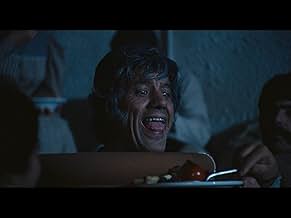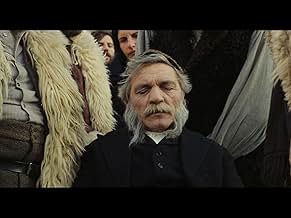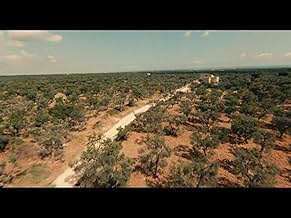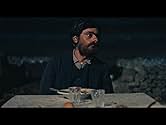NOTE IMDb
7,8/10
3,3 k
MA NOTE
L'autre Fils, Requiem, Mal de Lune et Entretien avec la mère, tels sont les titre des 4 contes mis en images par les frères Taviani. Ils nous transportent dans un univers envoutant ou la tra... Tout lireL'autre Fils, Requiem, Mal de Lune et Entretien avec la mère, tels sont les titre des 4 contes mis en images par les frères Taviani. Ils nous transportent dans un univers envoutant ou la tragédie, le fantastique et le rêve se confondent.L'autre Fils, Requiem, Mal de Lune et Entretien avec la mère, tels sont les titre des 4 contes mis en images par les frères Taviani. Ils nous transportent dans un univers envoutant ou la tragédie, le fantastique et le rêve se confondent.
- Réalisation
- Scénario
- Casting principal
- Récompenses
- 4 victoires et 8 nominations au total
Regina Bianchi
- Madre di Pirandello (segment "Colloquio con la madre")
- (as Régina Bianchi)
Avis à la une
I watched this film twice in the 1980s -I think on BBC-but it may have been on channel 4 at the time and was completely captivated by it. it has a haunting quality to it that is hard to surpass and will always stay with you.. Nicola Piovanni composed the music sound score and this Maestro of Music to mood -(see if you can, Caro Diario -Dear Diary Dir.Nanni Moretti as a more modern example of the art) is virtually unknown to the general public over here . Very Sad!.. It is also a complete nonsense that in this technically advanced digital age it is impossible to find a print of this CLASSIC movie -that all film buffs really ought to see-with English SUBTITLES! Spanish ,French and Dutch subtitle versions are around and findable on DVD but ALAS... non comprarlo Inglese!-How Insular! In addition, A Bande Originale -Soundtrack "KAOS" was released on Cd in the early 90s on the Milan label (Europe-USA and S.America?), but again the niche British public not catered for. Bizarrely, when shown on TV in the 80s the movie carried English subtitles-so how does this work then? Anyway back to the film. Enjoy the opening visually stunning shots of the Crow "eagling" its way through mountain landscape and let the accompanying music sink in and you're hooked!.without going into detail-thats for you to discover-the Taviani Bros really bring out the spiritual essence of the Sicilian persona characterised in Pirandello's daily Novellas.It is a flighted sentiment soaring over a gravitated earthy reality-Sicilian Style.This is Cinema at its most alluring.Do see it if it becomes available.
I saw Kaos, yesterday evening with friends who didn't know it or don't remember it. At this time, Italian cinema produces masterpieces. The emotional power acts after years, specially during the "novel" ends this movie, when Pirandello : at his top, comes back into the family house, re-open it, sees again, the only women he loves and remembers his trip, his family, his feelings : the splendor of childhood, the wildness of this isle, the warm of being protected & loved by his entire family in dramatic circumstances... Well : the music was written by Mozart himself. The beginning of this part is a kind of "Sergio Leone period : once upon in time..." a western like "I"m back" without guns and an harmonica. No action, but only emotion which grows again & again My POW ? A very great movie upon Sicilia, Mens, Women, family, land... See by two directors who knows emotion in movies are more important than 3D effects... God (Ford & Griffith) bless them Sorry my American & English are poor, but I'm just a french guy. See this movie and enjoy it (don't forget a bunch of Kleenex) you will never see that again.
The Taviani Brothers evoke the mystery, drama, and stark beauty of Sicily in this wondrous three-hour film, with its four earthy stories and sublime epilogue. In "The Other Son" a demented Sicilian mother (Margarita Lozano) longs to hear from her sons who have emigrated to American and forgotten her,. Memories of a traumatic rape experience as a young woman prevent her from being able to accept the love of her only devoted son who follows her around with his cows. "Moon Sickness" tells about a young bride who discovers that her husband likes to howl at the full moon. She is not without an erotic moonsickness of her own which makes her crave sex wit her cousin when the husband is unable to perform his marital duties. "The Jar" features comedians Franco Franchi and Ciccio Ingrassia in a classic comic narrative about a mean landowner's large broken olive jar and the jar-mender who gets trapped inside and their ensuing battle of wits. "Requiem" deals with rural shepherds who want to have a graveyard to bury thir dead. In the epilogue "Conversation with Mother", we see playwright/storyteller Luigi Pirandello returning to his native Sicilian town after years of success on the mainland. He encounters the spirit of his mother who recounts a fabulous fairy-tale journey taken when she had been a child. It is a stunning twenty-minute sequence that must surely rank with the best moments in the history of Italian cinema. The images of the children rolling down the mountain of pumice on the "Pumice Island" are of a poetic lyric intensity. The shot of Pirandello sitting silently in the chair that no longer contains the mother he had been speaking to is also utterly moving. Nicola Piovani's passionate and transporting musical score (he would later do the music for LIFE IS BEAUTIFUL)adds immeasurably to the the experience of this powerful work of art.
Artfully directed, lusciously photographed, and magnificent scored (in fact, I would say Nicola Piovani's music for this movie is some of the finest I've ever heard in my life), "Kaos" nevertheless leaves something to be desired when it comes to the five tales it tells. The first one, "L'Altro Figlio", is the strongest one emotionally, but it's also quite predictable after a point; you will guess why the mother has denounced her "other son" before it is revealed. The second, "Mal Di Luna", has an intriguing premise, but goes pretty much nowhere with it; when it's over, we're back to where we started. The third, "La Giara", is surprisingly my favorite: it's too slowly paced to work as a comedy, but it works better as an allegory, and it builds to an exhilarating musical sequence that is better seen than described. Besides, it's fascinating to watch the famous Italian comic duo Franco and Ciccio, both noticeably older, acting more mature than you may have ever seen them before! The fourth tale, "Requiem", is, frankly, tedious, and the weakest of the five. The epilogue, "Colloquio Con La Madre", is the part I was most looking forward to, mainly because of Pauline Kael's description of it as a "full-blown epiphany that sends you out dazed and happy". It takes quite some time to reach to that point, but yes, the way this story captures a life-defining moment of sheer happiness will stay in my mind for a long time. Despite my reservations, the experience of seeing and, above all, listening to this movie is not one to be missed. *** out of 4.
"Kaos" (Italian, 1984): Told are five stories, separate but woven together by location (an incredible, ancient, crumbling, sun bleached land) and other unique poetic devices. They are told over 188 minutes. I suggest a short break after each story. They are all unique. Each has separate value, and is worth absorbing. Directed by Paolo & Vittorio Taviani. These unsentimental folk tales are loaded with humanity's weakness, strength, silliness, pettiness, and plenty of important symbolic lessons ALWAYS worth chewing on. When our Old People aren't there to pass along these lessons, at least we have the film makers. The screen is our fire. The seats are our logs. The film team is our story teller. The darkened room is our night.
Le saviez-vous
- AnecdotesThe title of the movie comes from a quote of Luigi Pirandello, the author of the book the movies is based on. Pirandello used to say to be a "son of chaos", since he was born in Càvusu, a small village, whose name came from the Greek "Kàos", "chaos".
- Versions alternativesTheatrical release in Italy did not include the segment "Requiem".
- ConnexionsEdited into Bellissimo: Immagini del cinema italiano (1985)
Meilleurs choix
Connectez-vous pour évaluer et suivre la liste de favoris afin de recevoir des recommandations personnalisées
- How long is Kaos?Alimenté par Alexa
Détails
Box-office
- Montant brut aux États-Unis et au Canada
- 325 717 $US
- Week-end de sortie aux États-Unis et au Canada
- 11 412 $US
- 17 févr. 1986
- Durée3 heures 7 minutes
- Mixage
- Rapport de forme
- 1.85 : 1
Contribuer à cette page
Suggérer une modification ou ajouter du contenu manquant

Lacune principale
What is the Brazilian Portuguese language plot outline for Kaos, contes siciliens (1984)?
Répondre


